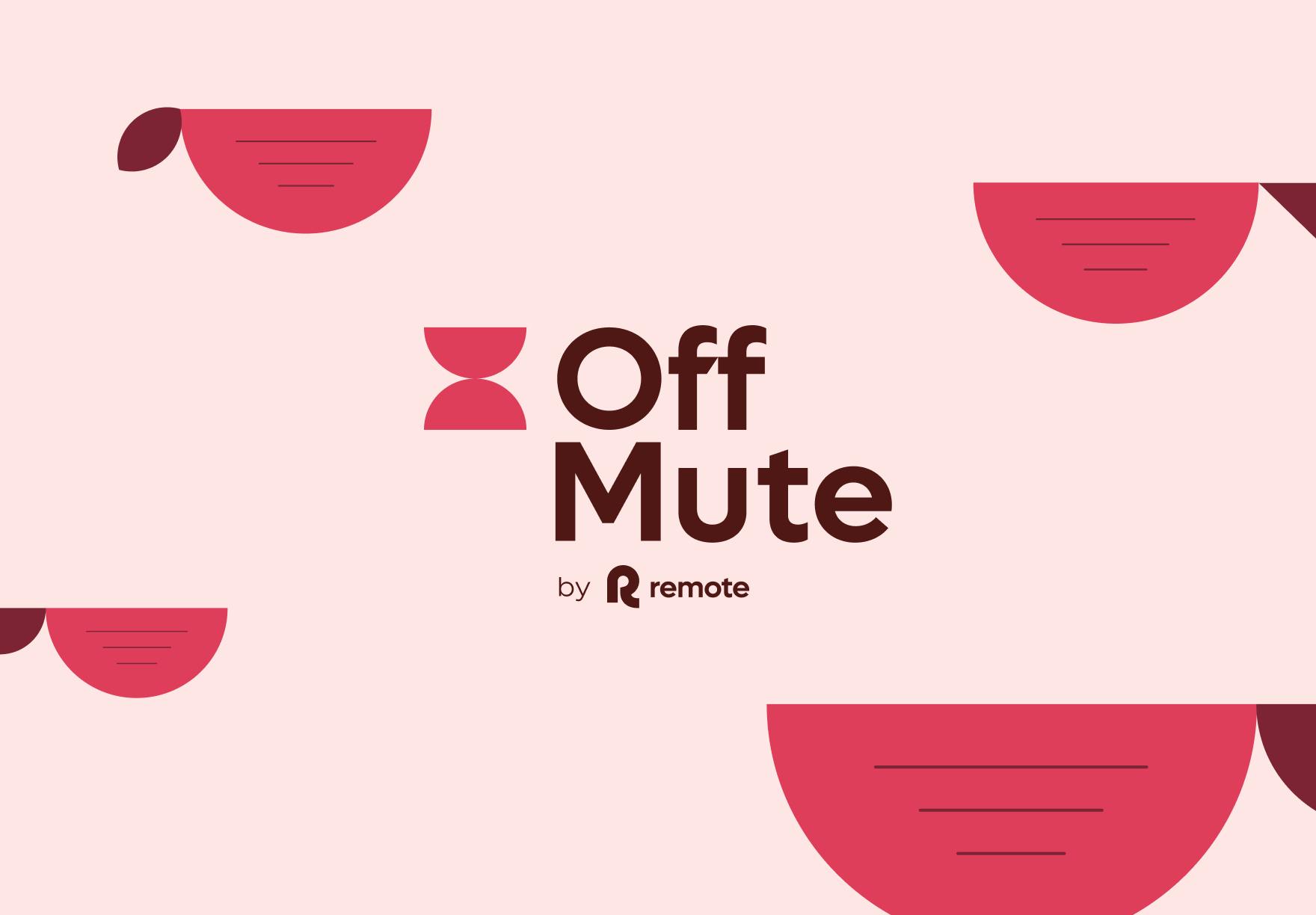
Global HR — 8 min

Podcast — 25 min
In this episode of Off Mute, Remote’s Chief People Officer Barbara Matthews speaks with Chris Priebe, CEO of Zelt, an HR software company. Chris discusses his previous career investing in tech startups and what he looks for in companies: strong teams tackling interesting markets.
Chris and Barbara discuss adoption of HR tools in Europe versus the US and how regulations around things like leave and payroll make HR systems more complex in Europe. Chris shares his perspective on AI/ML in HR, and while concerned about bias in recruiting, he sees automation as freeing up HR to focus on more strategic priorities.
Chris emphasizes the importance of security given the sensitive nature of employee data and preventing breaches. He talks about partnerships with companies like Remote and why point solutions will still be needed given the diversity of needs. Looking ahead, Chris predicts increased adoption of basic AI by HR leaders and discusses how distributed hiring enabled Zelt to bring in rare specialized expertise.
Barbara: Hi, I am Barbara Matthews, the Chief People Officer at Remote, and this is Off Mute, the podcast that explores managing distributed teams all across the globe.
In this episode, I am having a chat with Chris Priebe. Chris has swapped a career within the financial industry to lead Zelt, an all-in-one HR tool, which automates processes not just for HR but for finance and IT too.
In our chat, we look deeper into the everyday tasks, which can slow down SMBs or startups, and how new tech can be utilised.
We talk about being brave and we'll also look towards the future and discuss how tech can make a difference. Chris is hugely inspirational and really forward-thinking, so I think you're going to really enjoy our conversation.
Chris, thanks for chatting with me. Great to meet you.
Chris: Thanks Barbara. Very nice to meet you virtually and happy to be on the podcast.
Barbara: Yeah, we're delighted to have you. So, I had a little stalk on your LinkedIn today actually. And one of the things that really stood out to me was your career within finance before you moved into the tech space.
So, for anyone who doesn't know, any of our listeners, prior to being the CEO of Zelt, Chris had a career with finance and past work experience obviously involved you directing financial investments into tech companies and startups.
Tell me a bit about what stood out for you with regards to Zelt and then more generally, is there a common trait you have seen or that you look for in all of your portfolio companies?
Chris: I think there's two most important elements to it. There is the market and the team. And if either of those two is not, let's say supportive, then it's very unlikely that the company will be a success.
So, you kind of look at those two things and you understand whether the market is interesting, and whether the team is possibly one that can pull it off. Because building a large company is very, very difficult and a lot of unforeseen things will happen.
So, we have to back somebody who's very tenacious and can pull through as things change and adapt quickly.
Barbara: So, let's zero in on Zelt itself. So, you talk a lot in your messaging about how HR teams are signed up to multiple products, like I just said, with lots of different crossover.
At Remote, we see that our customers are offering … they're working with a lot of different HR tools. We have Rippling, HiBob, lots of different ones. Zelt is trying to solve for that software bloat with this one stop solution, bringing everything together. The company's two years old, right?
Chris: Yep.
Barbara: Talk to me a little bit about how the idea was conceived and even a little bit about the research that went into exposing this problem and what you were hearing from HR leaders.
Chris: The idea really began at what you just mentioned is the core problem, that things don't talk to each other and there are two ways to solve that.
One is you build these middlewares or these things that happen in the background and you kind of connect them, and they basically facilitate the communication of data, and there are plenty of tools out there.
And that was actually a spark for the ideas because we invested in quite a lot of tools that were very successful in different subsets of the markets, in different parts of the world that kind of all do the same thing. They just send data from A to B and from B to A at certain points in time.
And you could probably count 20 unicorns that just exited or were funded in the last two or three years. They're doing basically just that. And there are great applications for that.
And then the second way of doing it is, okay, you just put more things into the same platform into one platform. That means rather than having A to B, there is no B, there's just A, and that means the whole need for syncing just goes away. And I think both solutions are viable, but for different subsets of the market and for different customers.
And from a technical perspective, syncing from A to B is easy, but from A to B to C, in a triangular let's say dependency is almost impossible. It's like in physics, there's this thing called the three-body problem.
The two-body problem is very easy. It's like the basic problem of mechanics. The three-body problem already just adding one more is impossible to solve only by approximation. And with integrations, it's kind of similar.
It's not possible to keep three systems that have data that basically overlaps in sync, at least not with 99% effectiveness and accuracy, and things like HR and payroll, that's just not good enough. Because the mistakes are too costly, and that's why payroll is often wrong because the systems just don't talk to each other.
So, if you manage to get the amount of different data sets that really are out there into just less, and ideally one, but oftentimes one is not possible, but at least to minimise it, it means that a lot of the problems of integrating just go away and you don't need those tools at all. And there's pros and cons with those tools.
And there's another company called Merge.dev that basically did the first idea that I was ideating with. And I see they're very successful and probably raised a lot more than we have now. But also, the market is much smaller.
So, we're in a $200 billion market and then a maybe 1 or $2 billion market. So, both approaches have pros and cons, and you just have to, I think as a founder, also just pick the one that suits you best, that you find most interesting.
And also, one is a much more long-term, let's say trajectory, than maybe the other.
Barbara: According to Ernst & Young, more than 85% of a HR professional's time is taken up by admin. As a chief people officer that actually gives me heartburn. Zelt is trying to help HR teams eliminate the admin burden by automating these manual tasks.
Are you finding any, I guess hesitation or fear around the use of automation and AI in the HR world? Or are ambitious leaders generally excited to find opportunities to focus their team on kind of the more high-level strategic work?
Chris: There’s not one answer to this. So, I think the possible areas of application for AI are manyfold. I do see problems in things like recruiting for example. And I know AI has already been applied there for quite some time even before let's say, proper AI like open AI. And I think the problem of bias is a real one.
So, I think it's not really the focus that we are in. So, I think this is maybe for others to solve, but a self-perpetuating bias of those biases that already exist in our society today, I think it's possibly dangerous. So, I think it's totally fair that there's people that are worried and I think should be worried, and they need to be figured out.
When it comes to the area of automation itself, I can understand how at first sight it may look like this is taking jobs away or the need for humans is lessened, i.e., people will end up without a job.
But I think the strategic areas of where HR, people professionals can add value are so big that I think the time spent on admin is really just eating away from that, to help people develop, to find the right career path, to be able to coach them, or maybe develop line managers to be able to coach their team because they have no idea how that works. How are you supposed to know these things? These are skills that you have to learn.
And I think it's just an opportunity for HR professionals to broaden their skillset. And frankly, it's quite fun to work with these automation tools. And coding is now so much easier than it was, and you can maybe broaden your skill set by being able to use those tools and automate some of the things that are robbing your time.
Barbara: I love that. I know Zelt is finding exceptional success in the European market and even leading G2 Europe's regional grid for core HR tools, which is great. So, congratulations on that result.
Chris, what are the unique factors that you're seeing that are impacting the UK and Europe and how does the U.S. market differ from that?
Chris: So, I do have to say that my knowledge of the market is stronger in Europe and the UK. And when we speak to customers or potential clients, we get to understand what they ask for, what their problems are.
The U.S. market is slightly different in a way that even things like holiday or sick leave or even just employment itself, a lot of these things are a lot less well-defined while in Europe that's very different.
If you look at how, the things that you're entitled to in terms of annual leave for example, or sick leave in the UK, or maternity pay, they're very well-defined and you can sue your employer if you don't offer those things or you don't do it that way.
And in fact, there are hundreds of thousands of claims each year related to these things that software should do for you because usually, the calculation was wrong or something was forgotten.
And I think in Europe that's a lot more complicated, and that means also HR systems, even for smaller companies, are a lot more complicated than maybe they have to be in the U.S.
Let's say you change your working pattern throughout the year three times, you were in three contracts; you have to now break down your annual leave entitlement calculation to three different calculations with a pro rating of part-time. So, to do all those things is quite complicated.
The second element of course is payroll. I think in the UK it is maybe a bit simpler, where the U.S. is very complicated because you have federal taxes and state taxes.
Barbara: Yes, state by state.
Chris: And it's not nearly as digital as in the UK, which is also the case for most other countries. And that's also why there will be no VHR software for everyone because markets are quite different, companies are different sizes, we are quite different. The things that you put value on an HR system are very different to another vertical.
So, for example, if you run a restaurant business, the concept of scheduling shifts and tracking time of the specific hours that people work is a lot more important than in a company maybe like Remote or Zelt where people work mostly nine to five, Monday to Friday.
So, yeah, I think in general, the European market is probably a bit more complicated in terms of legislation and time tracking, but I think that's the challenge of an HR system to be configurable enough, so it still works for both countries without making it so complicated that companies stop understanding how the system works.
Barbara: Chris, I want to pivot a little bit into building a culture of innovation. So, HR leaders obviously have quite a strong role to play here. In fact, I personally think all leaders have a role to play in establishing that type of culture in a company.
But Zelt is a powerful resource for innovative companies. What emerging trends or focus areas are the most important for the HR leaders that you are engaging with and working with?
Chris: I think areas that have always been important and difficult for companies to manage and progress on, things like employee engagement, progression, keeping people in the company, the ones that you want to keep right and keeping them feel like they have a future in the company.
I think that's always been a challenge and I think that challenge is becoming stronger, especially when switching companies becomes easier. Because you have a bigger market now, you can join companies globally.
So, previously we were confined to a smaller area, now we can join a company anywhere. But I mean, what we are currently most interested in at the forefront is freeing up people's time so that they can spend time on what actually is … and they should figure out what is the most value adding piece of work they can do in their company right now. And that they actually have the time to do those things.
Because if you don't have the time to do those things, it doesn't really matter what are your main issues, you don't have time to tackle them. And I think that's where we see our role, freeing up time of leaders, giving them also the insights and the data so they can make the decisions that are good and important for their company by getting rid of repetitive administrative tasks that they're spending time on today.
And we'll be building things like simple AI-driven automations in the system where you can connect the dots and maybe give a recommendation or generate an insight that from a large table of data, you wouldn't be able to see clearly. So, I think that's where we can kind of come in.
Barbara: I want to go deeper into the emergence of remote working. So, firstly, what is the situation with Zelt? Are you remote, are you hybrid? Are you an office? What are you doing?
Chris: I'm right now sitting in our office in Belgravia, but we're still small, so we're not a huge team yet. We have two folks that are working from different countries. I would say we are an office-first company. It's not like there's a policy that says you have to be in the office. There's no specific rule.
But generally, we try to stay close to each other so we can communicate more easily. I founded Zelt during COVID, so we of course started out remotely, so I kind of know the pros and the cons of both things and I think they're both viable option. But yeah, right now we're on an office-first, but flexible setup.
Barbara: And in terms of the emergence of remote working and globally distributed teams, are you seeing any trends and how are they impacting your customers?
Chris: The viability of remote work depends on what type of business you are and also your size, I believe. So, a lot of our customers are growing companies, so they go from maybe they were small or medium-sized to slightly bigger companies. And I think their strategies may change along those lines.
Because when you're still a small company, you can actually still all sit together maybe in one floor or in one office. So, then there's a lot of benefits to that.
But if you become thousands of people, arguably, it kind of doesn't matter if you're all in the same building. You're not going to talk anyway if you are on the first floor and the other person on the fourth floor.
So, I think as you grow bigger, I think outsize is maybe the benefits of in-office work. I mean, it's hard to say in terms of trends. You probably know that better because you have, I think the direct market data. I think we have customers that do both. Some are fully in office, some are very distributed. And I would say most of them are a mix of both.
Barbara: And I think when you think about one of the key benefits of a globally distributed team, it's really around unlocking a wider talent pool and building a really diverse organization. And I know that Zelt cares deeply about diversity.
Tell me a bit about why it's important to you Chris, and also why you believe that the listeners should be prioritizing diversity within their teams.
Chris: So, I think it's something that you have to be mindful of from very early on because I think once you start developing a monoculture, it's very hard to revert. And I think you need a diverse team to be able to be open-minded and actually consider different types of opinions and different types of views on the world.
And where we grew up and what our, let's say background is, very directly defines our view on the world, and in the end, we build product for people. So, we have to understand our customers, our users, we have to understand and have empathy for how they think, how they may use the app, how we can possibly help them, and understand their problems.
And I think you will have more empathy as a company if you have a good mix of, I guess, however you want to measure diversity. But you're not all in the same age and you know you're all male or all female. I think generally it helps to just have a mix of people and it means you have more opinions on the table.
Barbara: Zelt enables employees to self-serve, which I am loving. So, it simplifies HR tasks which obviously, also reduces error. It also eliminates, I'm guessing, personal information being shared across emails and spreadsheets, individuals having access to stuff.
Talk to me about the security issues, Chris, and why they're so important with this tool.
Chris: I think historically employee data, particularly around payroll as well, has not been handled in a secure way. And I think even today most companies are not handling this securely.
I think email is still a very commonly used data exchange method when we kind of all know we should really not rely on email for exchanging any sensitive data. And there have been data breaches only this year in the UK that potentially have affected millions of UK employees because three of the largest payroll processors had data breaches all separately just this year.
So, I think there's a lot of investment missing in this space, both in terms of how, I think it's education and investment. So, A, on the education of how you should be handling employee data, and it should not be on a spreadsheet, on an open folder on your Google Drive.
But also, if you do use tooling, to make sure that you use tooling that are actually in the cloud and storing it in a way so that it doesn't have to now be transferred from one cloud to another one via some file transfer server, which is exactly what cost a lot of these data breaches.
Because there were prehistoric file servers that were installed, nobody knew who has access or nobody patched them. And that's kind of how people get access to this data. And I think historically, yeah, just very under invested.
You see it now more and more often that there's big data breaches in this realm. Previously it was mostly around customer data, and I don’t know if you've ever received any of these letter in your post, but it's now becoming a lot more often that hackers are targeting employee data because it's just so much easier.
And that's now reportable because any data breach containing sensitive data needs to be reported to the person. And you now also start seeing the first-class action lawsuits around this. That’s only starting now.
Barbara: In the UK, Chris?
Chris: Yeah, so I mentioned these three data breaches. So, one of them was Zealous, the payroll provider.
Barbara: Yeah.
Chris: And I think the law or the interpretation for the law is going to slightly change towards just because it was your payroll provider that maybe caused a leak, that doesn't mean you're not at fault as the employer.
And you can see now class action lawsuit for example, against BA that although it was a third party that is the payroll processor of BA, and I think that employers will now have to care about this because they can't just say, “Hmm, it wasn't us, it was our accountant, or it was our outsourced payroll provider.” That doesn’t work anymore.
Barbara: So, Chris, Zelt is a partner of Remote and we love working with companies that chair our approach to simplifying the challenges of HR. Can you explain to our listeners how these sorts of partnerships impact your product roadmap in any way?
Chris: So, of course, our goal is, and it's probably an unachievable goal, is that you can manage all your employee administration in one platform. And for some customers that may be true, but for most customers, you will not be able to achieve this.
Barbara: Why do you think that, Chris?
Chris: Why it's not possible?
Barbara: Yeah, I mean, I don't know. I'm hoping it is possible one day. Why do you think it wouldn't be?
Chris: Because the demands on what an employee platform should be doing is very different across different verticals and markets. So, I mentioned this example before, what a restaurant business needs, is very different to what a technology business needs. And that means you can't really solve always for both use cases.
And payroll is another problem. Payroll is very complex and difficult, and, in some countries, it may be digitised and others it's not. So, there is no such thing as global payroll engine for 200 countries where you just click a button, and it works. You need somebody like Remote that helps you do those things, those hard things, and has the knowledge in those markets and other things maybe you can do.
So, for us, the important decision on the product roadmap is what are the things that we believe we can solve for our customers, and what are the things where arguably, we should work with somebody like Remote or ATS.
For example, we've decided not to build in a hiring system. Maybe at some point in the future, but it's nothing that I personally now get super excited about because it's also from a data perspective, a different challenge.
And one of the things where we should really integrate with — even the integrations themselves, then the question is what does that integration do? Because integration could be very valuable or not valuable at all depending on what you do with it.
So, yeah, we have this partnership with Remote, which we're very excited about and the idea is that Zelt customers can onboard and pay your employees directly from within Zelt, powered by Remote. Which gives you access to all the countries around the world, and you can hire people very easily there.
Barbara: Brilliant. Love it. Let's keep the partnership growing. I have two more questions for you, Chris. Thank you for all of your patience with me so far.
So, fast forwarding into the next five years, in your mind, what are the major changes that you expect to see within HR in the next five years?
Chris: So, I think adoption of AI is now going to actually be real. We see it now in our day-to-day work. So, even things like sending an email, whenever it's more than four emails, we don't do that manual anymore.
We have a simple script in our Google Sheets, and you fill in some data and you click send, and it automatically creates the email with the right title and the right text. And I think HR leaders of the future will be able to use those tools.
You'll be able to do simple programming in their Google Sheet, and all these things that are embedded. So, you don't have to be an engineer or an expert to do these things. You can learn it literally in a few days.
And you'll be able to bridge some of those gaps and automate some of those tasks that you used to spend a lot of time on. Like sending out documents to like a hundred people. If each of these is a separate email, that's an hour gone, because you'll need at least one or two minutes per email.
Barbara: When I was a HR coordinator, I remember doing stuff like that. It would take me the whole day I'd be sending these individual emails to all the different employees.
Chris: Takes forever. And one typo in the email, if it's a sensitive document, then it's like every time you type in the email, it's like your heartbeat goes up a little bit, because you can make a mistake.
But if you use the raw output from your system and you don't type anything hand by hand, you just have it in your spreadsheet and you click a button, and it sends it automatically. And of course, having modern HR systems will help you do those things without now you having to spin up some script in Google Sheets.
But the reality is you need to have some flexibility because you’ll always have this new problem that you don't know yet how to solve it or maybe it's an extra add-on in your HR system, and software's now becoming very expensive. So, just because it's there, doesn't necessarily mean that you will be able to pay for it.
But a lot of these tools that you can run directly in your spreadsheets, they don't cost a lot of money, and you can start doing this today yourself. I think in five years, especially as also maybe, new generation of HR leaders are coming into the profession that are more maybe-
Barbara: Tech-savvy.
Chris: It'll become more of a normal thing. But I think anybody can learn it, and I think in five years’ time it'll be also still much easier than it is today.
Barbara: Great. Ooh, I'm excited. And Chris, my final question that I ask all of our interviewees, is can you think of a time when you've had to deal with a challenge (now this is probably since you started during COVID) that made you think this could only happen with distributed work?
Chris: So, we're still a pretty small company, so we don't have hundreds of people in the team, but there are some specific skills that we needed for building a very specific part of the product.
And there are really only three, four companies in the world that we do this well, and there's kind of really only one market leader. So, ideally, you want to hire somebody from that market leader and there's not a single person in London, like not one.
So, of course, we could only solve that problem by hiring remotely, and we found a great hire and we built that part of the platform. And yeah, we now have the person that built a market leading tool for something that now is running in Zelt, and that's great.
Barbara: Oh, brilliant.
Chris: So, we could not have done that without remote work.
Barbara: That's great. People usually tell me catastrophic stories, Chris. So, it's really good that there's a good news story that comes out of that final question.
I want to thank you so much for taking the time to chat with me today.
Chris: Thanks, Barbara. It was really a pleasure.
Barbara: Thank you so much to Chris for talking in depth about Zelt. Well, that just about wraps it up for the latest episode of Off Mute. I'm Barbara Matthews, the Chief People Officer at Remote, and we'll be back in two weeks with the next episode.
But in the meantime, please subscribe to the podcast, and if you like what you've heard, give us five stars as it helps others like you find our podcast. Thank you for listening to Off Mute from Remote, catch you next time.
Subscribe to receive the latest
Remote blog posts and updates in your inbox.

Global HR — 8 min

Visas and Work Permits — 8 min

Global HR — 12 min

Global HR — 15 min